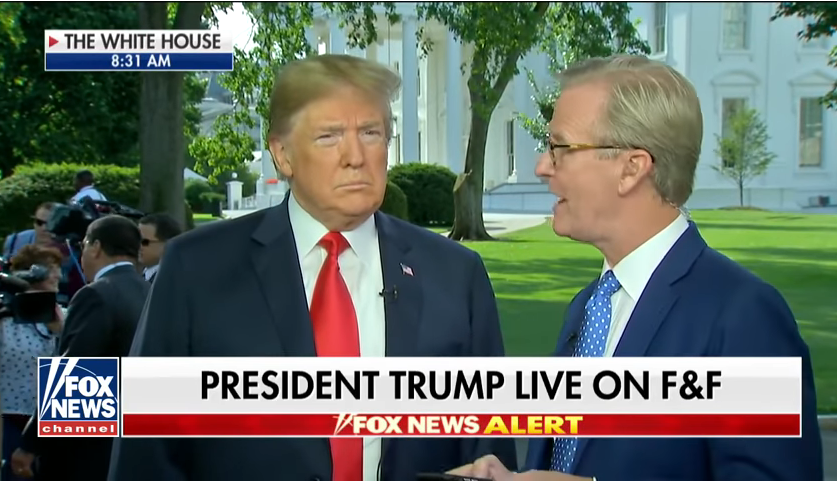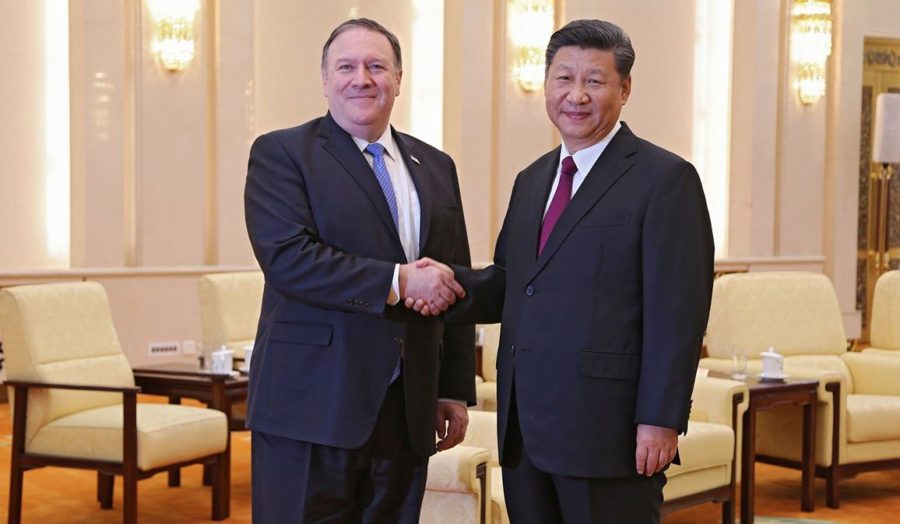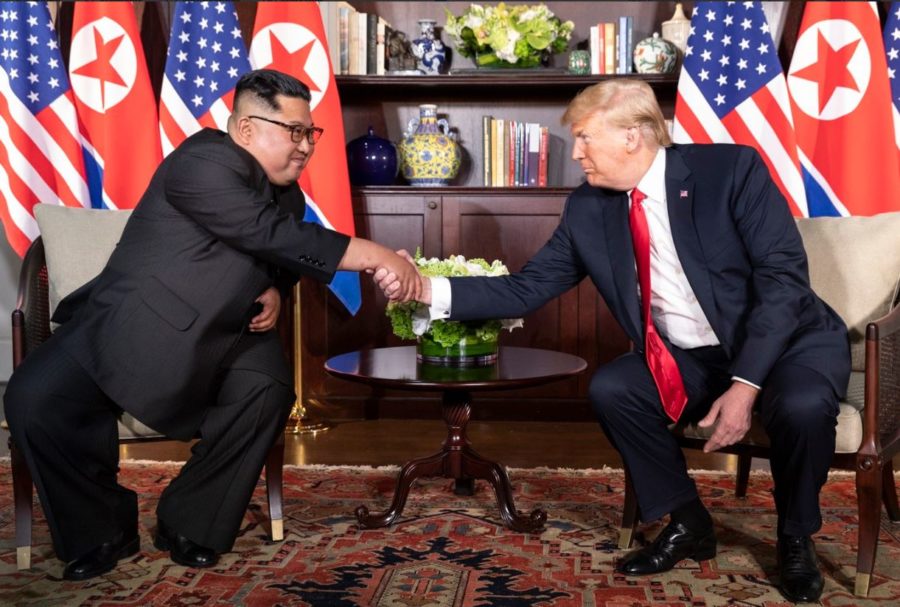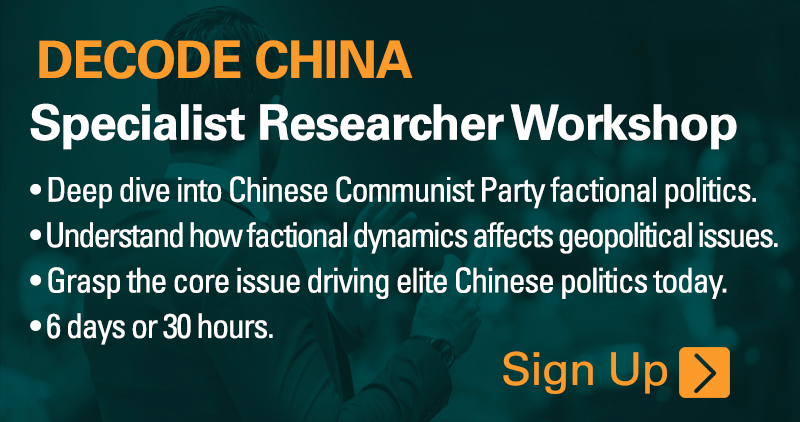◎ We examine the “worst-case scenario” of what the implementation of U.S. tariffs might mean for America, China, and North Korea.
On June 15, United States President Donald Trump announced tariffs on Chinese imports.
Details from the White House and the Office of the United States Trade Representative (USTR) include:
- The U.S. would impose a 25 percent tariff on $50 billion of Chinese goods that contain “industrially significant technologies,” including those related to China’s “Made in China 2025” policy.
- The list of 1,102 separate U.S. tariff lines is split into two sets. The initial list includes 818 items worth $34 billion, and would go into effect on July 6. The second set would undergo a further review and public hearing before the USTR makes a final determination.
- In a statement, Trump said: “The United States will pursue additional tariffs if China engages in retaliatory measures, such as imposing new tariffs on United States goods, services, or agricultural products; raising non-tariff barriers; or taking punitive actions against American exporters or American companies operating in China.”
According to Reuters, the U.S. is nearly done with a second list of tariffs worth $100 billion. When the second list is finalized, it would take 60 days or more to be placed into effect because it would be subject to the same review process as the initial lists.
U.S. Trade Rep. Robert Lighthizer told Fox Business Network that the tariffs are “thorough,” “moderate,” and “appropriate.” He said: “Our hope is that it doesn’t lead to a rash reaction from China.”
Lighthizer also said on the tariffs: “Our hope is that it ends there, we can have negotiations, remove some of the structural barriers, while at the same time opening up China.”
The Chinese commerce ministry wrote on its website: “China is unwilling to have a trade war, but the Chinese side has no choice but to strongly oppose this, due to the United States’ myopic behavior that will harm both parties.
“We will immediately introduce tariff measures of the same scale and strength. All the results from the negotiations previously reached by the two parties will be invalid,” the commerce ministry said.
Later, the Chinese State Council announced retaliatory tariffs of 25 percent of $34 billion worth of U.S. goods, including on automobiles and soybeans. The duties would be implemented on July 6.
The big picture:
The U.S. announced $50 billion of tariffs on Chinese goods in April. After China responded with $50 billion of tariffs on American products, Trump ordered an additional $100 billion of tariffs. In May to early June, top trade officials from both sides held talks in Beijing and Washington to resolve the trade issue.
The tariffs also come after President Trump and North Korean leader Kim Jong Un’s June 12 summit in Singapore. They signed a joint statement where they agreed to work together to achieve complete denuclearization of North Korea.
Our take:
Sun Tzu wrote in The Art of War: “The highest form of generalship is to balk the enemy’s plans; the next best is to prevent the junction of the enemy’s forces; the next in order is to attack the enemy’s army in the field; and the worst policy of all is to besiege walled cities.”
Before the announcement of tariffs, we believed that the Trump administration was executing the “highest form of generalship” in handling China. The threat of tariffs and the ZTE business ban saw China and Xi Jinping cooperate to bring North Korea to the negotiation table and roll out measure after measure of economic reform. The ZTE “probation” deal in particular gives the U.S. strong leverage over the Chinese regime for at least a decade, and appears to have been crafted with America’s long-term national security interests in mind.
We are now unclear if the Trump administration’s earlier moves were based on a thorough understanding of Chinese Communist Party (CCP) operations. The U.S. tariffs are akin to the stratagem which Sun Tzu considered to be the third-best, namely, to “attack the enemy’s army in the field.” Based on our research, we believe that the outcome would lead to Sino-U.S. trade tensions being “prolonged beyond what is tolerable for both countries,” and worse. Ultimately, the U.S. would still emerge victorious in a trade war with China, but potentially at an immense cost for America and the world.
We examine the “worst-case scenario” of what the implementation of U.S. tariffs might mean for America, China, and North Korea.

The U.S.
1) While we anticipated that President Trump would suspend tariffs in light of Xi Jinping and China’s help with North Korea, we also noted that “Trump could still press ahead with tariffs or reduced tariffs on June 15 if there is a lack of mutual trust between the two sides (hawkish voices in the administration winning out, for example), or if Trump believes that Xi is not doing enough to liberalize China’s economy.”
In light of the U.S. tariffs, we offer some more possible explanations:
- Trump has spoken of his good chemistry with Xi Jinping, but their relationship may not be enough to overcome years of deep suspicion of China. Neither would three rounds of Sino-U.S. trade talks. After all, the Chinese Communist Party (CCP) has overseen measures like forced technology transfer and intellectual property theft, while state-backed Chinese tech companies produce equipment that the U.S. and other countries have determined to be security threats. CCP policies and the policies of past U.S. administrations have also contributed to the enormous trade gap between both countries.
- Trump is likely not convinced by Xi’s efforts to open up China’s economy in recent weeks. He also rejected a deal for China to purchase $70 billion of U.S. goods, according to Reuters.
- Trump might feel the need to go along with the hawks in his administration after the moderates failed to negotiate a trade deal that he is satisfied with. Also, Trump might be under pressure for granting a reprieve to ZTE.
- Trump could feel the need for tariffs to resolve domestic political and economic issues. U.S. debt is at an all-time high (about $21 trillion) and the Trump administration’s tax cuts have contributed to increasing the deficit. The U.S. tariffs appear to be aimed at cutting the U.S.-China trade deficit, increasing fiscal revenue, and protecting U.S. manufacturing. If the tariffs reduce the deficit and do not adversely affect farmers and workers, Trump could help Republican Party candidates win more support before the midterm elections in November.
2) On the whole, the Chinese tariffs should not too adversely impact the U.S. economy. Trump could lose some political points, however, when the price of food or electronics rise.
3) Despite Robert Lighthizer’s hopes, the political culture of the CCP dictates that China would carry out tit-for-tat tariffs. China’s reform and opening up may or may not go as smoothly as expected; there is even a possibility that greater economic liberalization may never come (see “China” subsection). The U.S. may also be faced with a North Korea who may suddenly not be too keen to denuclearize (see “North Korea” subsection); and find itself in confrontations with China over the South China Sea and Taiwan. Further, the CCP could crank up its propaganda machinery to turn the Chinese people against America as China’s economy deteriorates. The relationship between China and the U.S. would continue along an antagonistic path with potentially dire consequences for both sides and the world.
4) According to a June 14 Reuters report, “Trump no longer thought of China’s influence over North Korea as a compelling reason not to impose tariffs now that the United States had a direct line of communication with Pyongyang.”
Trump’s line of thinking is hugely puzzling in considering that his Secretary of State believes that Xi Jinping and China have huge influence over North Korea. Mike Pompeo had thanked China and Xi for “helping bring North Korea to the negotiating table and for the continued support as we work to achieve the complete, verifiable, and irreversible denuclearization of North Korea” a day before the tariffs were announced. Also, Pompeo had reportedly “urged other US officials to avoid escalating the trade dispute with China” before the Singapore summit because he was worried that Xi, who has “more leverage over Kim Jong Un than any world leader,” might be annoyed, according to The Financial Times. When Pompeo was CIA chief, he told Bloomberg that Xi had “incredible capacity to do good around the world” if he consolidated power at the 19th Party Congress.
Certainly, Trump and his administration might believe that they can deal effectively with North Korea without the support of Xi and China. This line of thinking, however, reflects a gross lack of understanding of how the CCP operates and retaliates.
5) The U.S. tariffs would create difficult political problems for the Xi Jinping administration. To overcome his political problems, Xi could end up adopting a hardline stance towards America, to the detriment of his relationship with Trump and both countries. Should Xi be unable to overcome his political problems and is ousted, the Trump administration should expect to find the incoming CCP leadership to be far less accommodating than Xi.

China
1) China, unlike the U.S., is an authoritarian country under CCP rule. And the CCP has a political culture that is drastically different from that in America. Unfortunately, the mainstream view of the CCP is rife with unhelpful inaccuracies.
Some common fallacies include:
- The CCP is a political monolith and its top cadres are united in working towards the singular goal of protecting and advancing the CCP’s interests.
- Xi Jinping is an all-powerful, unquestioned supreme leader that is responsible for every single bureaucratic decision. Put another way, the actions and words of a ministry or individual official are ultimately an extension of Xi’s will.
- State propaganda, taken at face value, accurately reflects the intentions of the CCP and Xi Jinping.
In reality:
- The CCP has always been divided along factional lines. CCP cadres are only united on the point of ensuring the regime’s survival, and leading cadres may have very different ideas and approaches to promoting and advancing Party interests. It is the difference in approach that leads to live-and-death factional fighting.
- Xi Jinping has consolidated power to a great degree, but he is by no means unquestioned or all-powerful. Unlike past leaders, Xi had no obvious factional allegiance before taking office, and the CCP officialdom at large showed “passive resistance” to his rule for much of his first term. There is a very good reason why Xi put Liu He, a trusted confidant, in charge of overseeing trade and with leading the Sino-U.S. trade talks.
- Unless they receive specific instructions from the top, the CCP bureaucracy defaults to “traditional” CCP rhetoric and behavior on a day-to-day basis. Those unfamiliar with this political culture could presume that the CCP’s higher ranks are being duplicitous when middle-to-lower rank officials speak or behave in a manner that departs from a new rhetorical line.
- Oftentimes, it is the middle-to-lower rank officials who fail to grasp the intent of their higher-ups. A recent case involving Chinese WTO officials not admitting to China’s intellectual property violations is an example. Of course, some expertise of CCP operations and elite politics is required to tell apart a misunderstanding from a genuine attempt to play out an opponent.
- It takes a deep understanding of Party culture and CCP operations to read between the lines of state propaganda and sieve out actual meaning. Such expertise cannot be easily acquired by just learning how to read Chinese or from textbooks on the CCP.
2) The U.S. tariffs represent a major diplomatic defeat for Xi Jinping and a huge loss of face (the tariffs were implemented on his birthday). Xi may take the defeat in his stride, but the CCP’s political culture dictates that he has to retaliate or face serious challenges to his rule from rivals and the system.
The CCP has already loss face when selling to the Chinese people proposed concessions to the U.S. at the three rounds of Sino-U.S. trade talks. While state mouthpiece Xinhua maintained the strained rhetoric of “win-win” cooperation with the U.S., the Global Times and the Communist Youth League, two outlets that have long been in the hands of Xi’s rivals, hinted strongly that Xi’s team was selling out the country with “unequal treaties.” Meanwhile, Chinese netizens routinely mocked CCP propaganda for painting a rosy picture of the trade talks when China was in fact “losing” the trade war with the U.S. if the reported concessions were made.
Now with the U.S. tariffs confirmed, the CCP no longer needs to roll out risible propaganda, and would likely voice out strongly in less ambiguous terms what it thinks of America and the trade conflict.
3) The CCP could continue to accelerate China’s economic opening up to attract foreign investments and resolve its capital outflow issues. On the flipside, the CCP could abandon reforms, gradually close up China, and move to strengthen its “stability maintenance” efforts if it encounters extreme confrontations from the populace.
According to a Jan. 15 report by the All-China Federation of Supply and Marketing Cooperatives, the CCP had reorganized over 10,000 grassroots supply and marketing cooperatives over the past five years. There are now a total of over 30,000 grassroots cooperatives in China. Township coverage has increased from 56 percent in 2012 to the current 95 percent. Supply and marketing cooperatives are products of the CCP’s plan to boost its supply system. In other words, the CCP has been preparing to handle a political crisis of the worst-case scenario for some time.
4) As the CCP is pushed to the limit by the trade war, it would seek to engender and escalate conflict in other spheres to make life difficult for America. For instance, the CCP could increase military operations near Taiwan or in the South China Sea.
We earlier analyzed that the CCP could be cooperating with the U.S. on North Korea in hopes that a trade war would be delayed. Now that the trade war is on, the CCP could find ways to see that North Korea does not cooperate with the U.S. on denuclearization, including relaxing sanctions and secretly playing up Pyongyang’s suspicions of the U.S. It may yet be too early to declare the Trump-Kim summit a success.
5) The U.S. tariffs heighten the political risk faced by the Xi Jinping administration. Xi’s political opponents and those who have reason to be unhappy with his rule would undoubtedly seize the opportunity to mount a counterattack. To curb anti-Xi forces, Xi may find it necessary to further strengthen the Chinese regime’s control over society. Increased social control would lead to increased social tension, and further endangers the Xi administration.

North Korea
1) Xi Jinping might not have a good relationship with Kim Jong Un, but the CCP has long had an influence over its brother communist regime in North Korea. In retaliation for tariffs, the CCP could opt not to cooperate with the U.S. in enforcing sanctions and instead find ways to aid Pyongyang, or drive a wedge between the U.S. and North Korea. The denuclearization of North Korea may not occur as easily as the Trump administration might expect post-tariffs.
2) The PRC and the DPRK still have long-standing security agreements (the Sino-North Korean Mutual Aid and Cooperation Friendship Treaty [1961-2021]). In the event that the CCP decides to support Pyongyang in discontinuing its denuclearization, the U.S. would find it harder to control the outcome of military action against North Korea.













